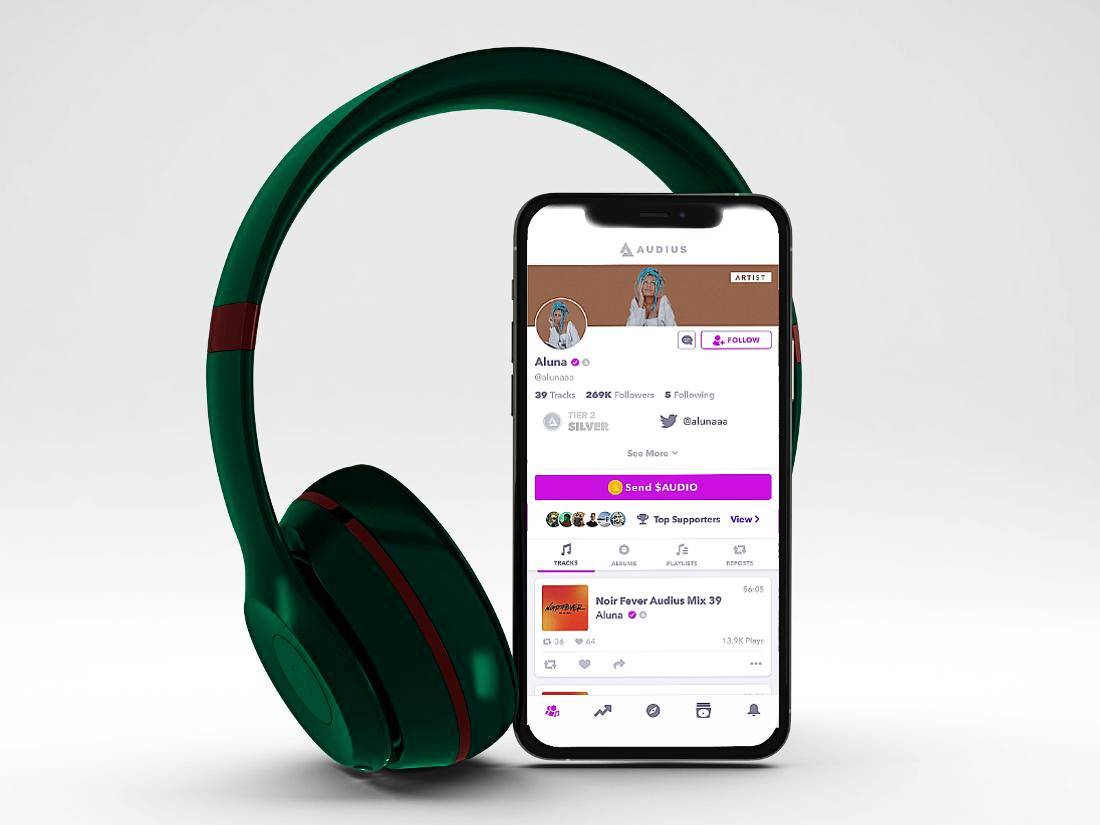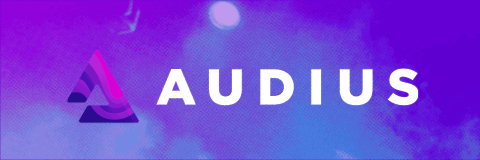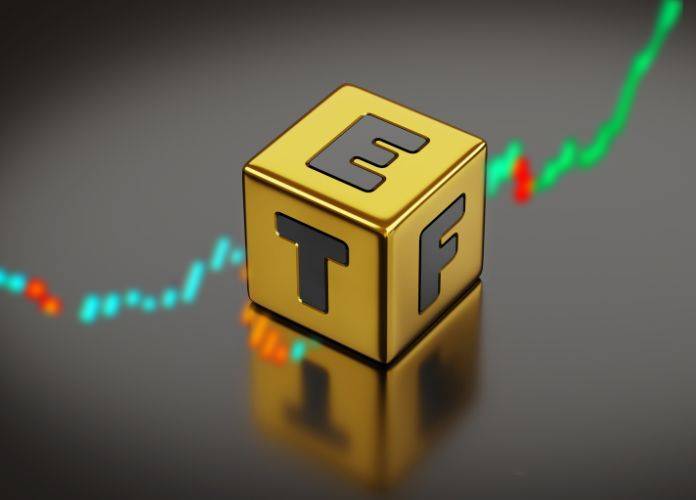The music industry, with its digital distribution, extensive data tracking, and universal appeal, seems an ideal candidate for blockchain disruption. So how is it shaping up?
Blockchain’s journey to significantly transform any industry, has been slower and more complex than anticipated. Despite all its promise, it hasn’t made a dent in the real estate sector, banking has been a slow grind marked by catastrophe (BlockFi and Celsius for example), and its market share of the remittance market remains insignificant.
The music business was also supposed to be ‘low hanging fruit’, but it’s been anything but. In this article, we’ll examine the reasons why progress is slow, and profile three projects that are making inroads.
The Elusive Blockchain Revolution in Music
Blockchain technology promises to revolutionize various sectors, and the music industry, at first glance, appears to be a perfect match. The digitization of music, combined with the internet’s global reach, suggests a seamless integration with blockchain to enhance transparency, efficiency, and artist compensation. However, the reality is starkly different. Numerous blockchain-based music projects have emerged, but none have lived up to their potential.
The reasons are multifaceted, but a key factor is the technical nature of these projects, often spearheaded by developers and blockchain enthusiasts rather than industry insiders. This disconnect from the music industry’s intricate ecosystem — characterized by complex legal rights, entrenched legacy players, and a delicate balance of creativity and commerce — has stymied many promising initiatives from the get go.
Why Blockchain Music Struggles To Harmonize
The music industry is notoriously complex, woven from a dense fabric of copyrights, contracts, and relationships that have evolved over decades. Blockchain projects aiming to disrupt this space often underestimate the industry’s intricacies, leading to solutions that, while technologically sound, fail to address the sector’s nuanced needs.
The challenge is not merely technical but deeply rooted in the industry’s structure, requiring a nuanced understanding of its operations, stakeholders, and revenue flows. Most blockchain ventures in music focus on the technology’s potential without fully grasping the practical and legal hurdles of implementing such innovations on a large scale.
Navigating the Industry: Projects Making a Mark
Despite these challenges, the following noteworthy projects have managed to carve out niches where blockchain can genuinely add value. Importantly, they’re focusing on enhancing only some aspects of the music industry without attempting an outright overhaul. These initiatives stand out not only for their technological innovation but also for their strategic approach to integration within the existing music business framework.
What Does Audius Do?
In discussing these initiatives, while there’s a wealth of detail to delve into, we believe in keeping explanations straightforward. Essentially, Audius revolutionizes music streaming by offering a decentralized service akin to well-known platforms like Spotify, Apple Music, and Amazon.
The Role of Blockchain in Audius
Central to the Audius platform is the AUDIO cryptocurrency, which plays a pivotal role across the company’s operations, primarily designed to motivate the three key components of the Audius ecosystem:
Node Management
Audius operates on a decentralized network where independent node operators are responsible for delivering content (streaming music) and managing databases that include user profiles, playlists, and follower lists. These contributors are compensated with AUDIO tokens for their efforts.
Supporting Musicians
Notable artists such as Nas, Katy Perry, and Jason Derulo, despite being early backers of Audius, have limited presence on the platform. The majority of music available comes from emerging independent artists.
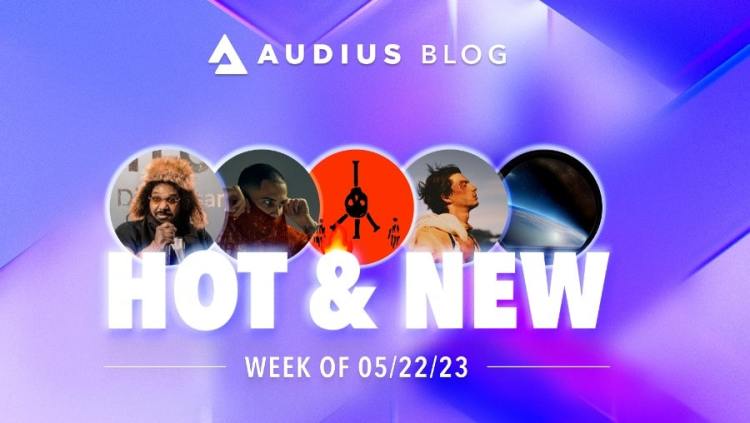
Artists are encouraged to upload their music at no cost, with the opportunity to earn AUDIO tokens for achieving popularity milestones, such as ranking among the top five weekly trending tracks or playlists.
Engaging Fans and Listeners
Listeners and fans are crucial for streaming platforms, and Audius incentivizes this audience with AUDIO tokens for engaging with artists and curating popular playlists. Additionally, Audius periodically distributes AUDIO tokens to its users. Holding AUDIO tokens also grants users governance rights within the Audius platform.
Investment and Technical Backbone
Since its inception in 2018, Audius has secured $14.6 million in funding from notable investors, including Coinbase Ventures, Pantera Capital, and Multicoin Capital.
AUDIO, an ERC-20 token based on Ethereum, facilitates music streaming at 320kbps quality. Audius is accessible through both desktop and mobile applications on iOS and Android platforms.
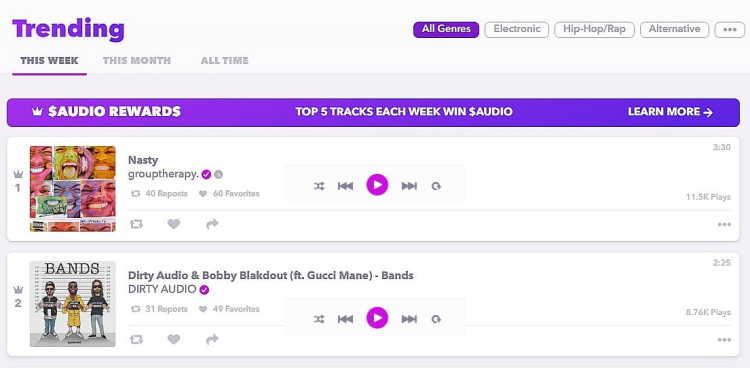
Achievements and Partnerships
Audius has successfully launched a blockchain-based music streaming service, matching the user experience of leading streaming services. Its collaboration with TikTok in 2021, allowing Audius artists to share their tracks on the social platform, underscores its innovative approach. With an average of 4 million monthly users, Audius demonstrates significant engagement in the crypto space, as confirmed by traffic analysis from Similarweb.
Looking Forward
Audius stands out for creating a vibrant ecosystem and economy around the AUDIO token, highlighted by its partnership with TikTok, which momentarily boosted its market cap beyond $1 billion. These achievements, despite relatively modest funding, indicate a promising direction for the platform.
However, the long-term viability of Audius as a business within the music industry remains uncertain. Without subscription fees, charges for uploads, or copyright ownership, the platform’s revenue model is unclear. Despite its strong start and celebrity endorsements, Audius must navigate towards more sustainable business practices to realize its full potential.
Core Functionality of Tunedly
Diverging strategically from its competitors, Tunedly has embarked on, not a niche journey, but instead creating a comprehensive music ecosystem. This ecosystem encompasses music production, streaming, engagement between fans and artists, publishing, and sharing of music royalty revenues, all centralized around the TunedCoin (TUC) utility token. Nonetheless, Tunedly is focused on integrating with the existing system – not disrupting it.
Blockchain Integration in Tunedly
Originating from an online music production service that has successfully completed over 30,000 projects since its inception in 2016, Tunedly has expanded to address the challenges artists face with traditional streaming platforms. To counter these obstacles, Tunedly introduced its own streaming service, Tunedly.com, allowing free uploads for artists and offering listeners diverse music genres like Pop, Rock, Hip Hop, and Country at no cost.
Tunedly’s philosophy, “Only Music Matters,” is reflected in its streaming service, where tracks are presented solely by their titles, without any artist images, biographies, or videos, focusing purely on the musical content.
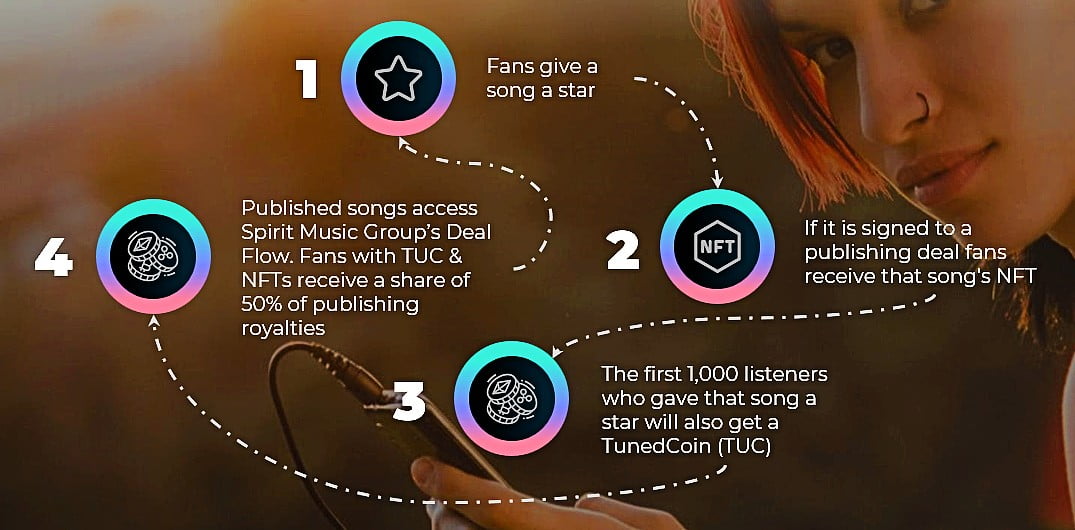
Listeners have the opportunity to endorse their preferred tracks, earning a combination of TunedCoins and song NFTs for their participation. The most celebrated tracks, as determined by listener votes and Tunedly’s analytics, are eligible for publishing contracts through Tunedly’s partnership with Spirit Music Group, a prominent U.S. music publisher. Tunedly shares copyright royalties equally with the initial fans who supported these tracks, facilitating royalty distributions via blockchain technology.
Financial and Technical Aspects
Since its launch in 2016, Tunedly has secured around $1.5 million in seed funding and is preparing for a TunedCoin IEO in March 2024. TunedCoins are based on the ERC-20 token standard on the Polygon Smartchain, with song NFTs utilizing the ERC-1155 protocol.
Tunedly’s Unique Ecosystem
Tunedly distinguishes itself by developing a full-fledged music ecosystem atop a profitable music production business. This ecosystem not only supports artists produced by Tunedly but also welcomes uploads from other artists to its streaming platform, which is not exclusively limited to Tunedly-produced music.
Ecosystem Incentives and Achievements
Tunedly incentivizes fans to engage as de facto A&R agents, rewarding them for identifying standout songs with TunedCoins and song NFTs. The most popular songs secure publishing deals, with all associated publishing revenue shared with fans who contributed to their selection.
Despite modest beginnings, Tunedly boasts a solid foundation with 3,000 production clients and over 30,000 completed projects. It has crafted a unique streaming platform focused purely on music, collaborated with industry stalwarts like Spirit Music Group, and tapped into various music revenue streams.
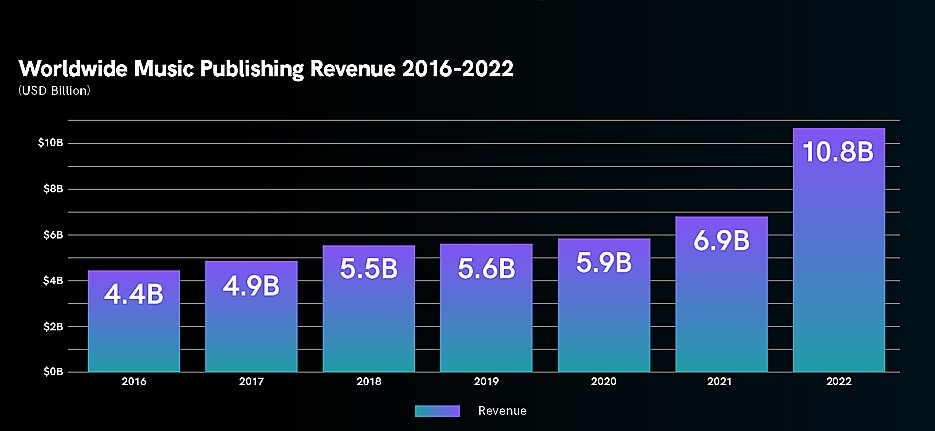
Future Prospects and Challenges
With a monthly website traffic of approximately 100,000 and a steadily growing listener base on its streaming platform, Tunedly faces the challenge of scaling its audience and articulating its vision to a broader demographic to ensure long-term viability. The company’s advisory board includes notable figures such as Harvey Mason Jr, CEO of the Recording Academy, and Matthew Knowles, founder of Music World Entertainment, highlighting its industry credibility.
As Tunedly navigates its growth trajectory, the key to success lies in expanding its listener base and effectively communicating its innovative approach to revolutionizing the music industry.
Understanding Royal.io’s Unique Approach to Music Royalties
Royal.io stands out by bridging the gap between music enthusiasts eager to invest in a song’s streaming royalties and artists looking to share a portion of those earnings. This platform facilitates a direct connection, allowing fans to own a stake in the future revenue of music tracks.
Royal’s Distinctive Transaction Model
Royal operates as a facilitator, providing a platform for artists and rights purchasers to connect without directly involving itself in the transactions. This hands-off approach is detailed in its terms of service, emphasizing Royal’s role as a conduit rather than a custodian or controller of the Song Tokens and blockchain interactions. Royal’s platform enables artists to offer non-fungible tokens (NFTs), referred to as Song Tokens, directly to buyers, with Royal remaining neutral in the transactions and not guaranteeing the fulfillment of promises made by artists.
The Mechanism Behind Royal’s Blockchain Utilization
Royal introduces a novel concept where fans can acquire a share of an artist’s royalties by purchasing NFTs, known as LDAs, during initial drops. These drops function similarly to ICOs or IEOs but are focused on individual songs. Artists have the autonomy to price these LDAs, with higher tiers offering greater shares of royalties and potential additional benefits like exclusive fan experiences.
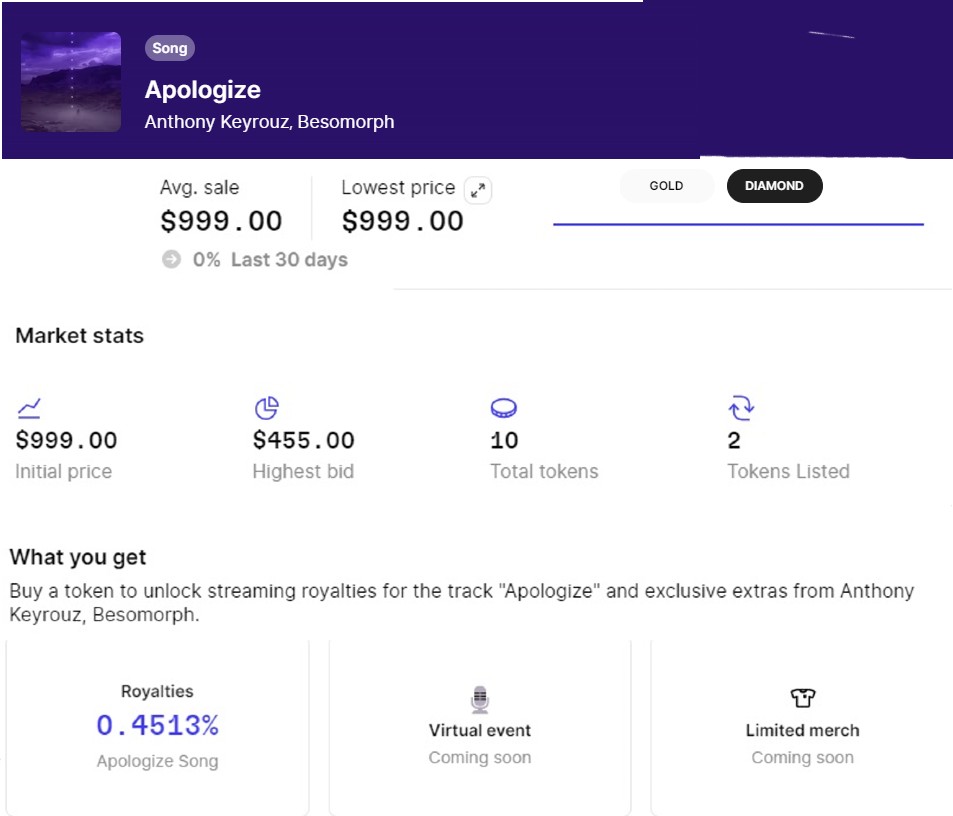
Funding and Technical Infrastructure
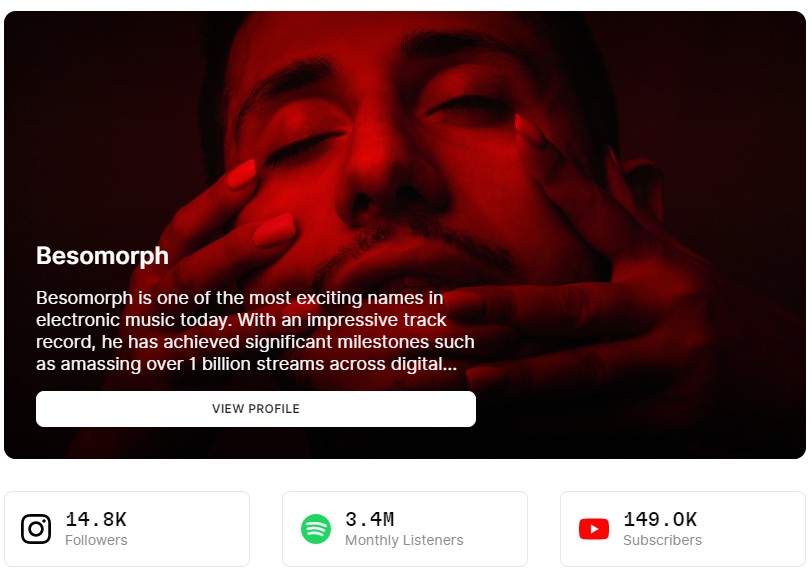
Royal has impressively secured significant funding, with a $16 million seed round followed by a $55 million Series A round led by notable investors including The Chainsmokers, Nas, and venture capital firm Andreessen Horowitz. Royal’s NFTs/LDAs are minted as ERC-1155 tokens on the Polygon blockchain, facilitating transactions through MetaMask and other wallets soon to be supported.
Royal’s Impact and Future Prospects
Royal has quickly emerged as a leader in the crypto music project space, particularly in terms of capital raised. It focuses on enabling fans to own music royalty rights, a niche yet significant aspect of music copyright. Despite not directly involving itself in revenue collection and distribution—a process traditionally managed by copyright holders and Performing Rights Associations—Royal offers a platform for artists to raise funds and for fans to potentially earn from streaming revenues.
While Royal has made strides in promoting music royalty ownership, the broader music industry’s complexities pose challenges, particularly in ensuring royalty payouts to NFT holders. The success of this model depends on the artists’ track popularity and their diligence in revenue distribution. Royal’s revenue model remains under development, with plans to introduce charges for artist drops. The substantial investment raised offers Royal flexibility to navigate these challenges and explore expansion opportunities, potentially revolutionizing how music royalties are shared and monetized in the digital age.

